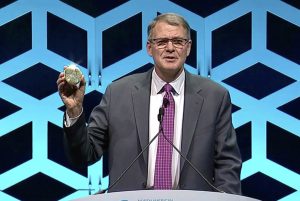CFF Offers Emotional Send-off to Retiring CEO Preston Campbell

Preston Campbell, MD, longtime CEO of the Cystic Fibrosis Foundation, speaks at NACFC 2019 in Nashville. (Photos by Larry Luxner)
Preston W. Campbell III, MD, recently bid farewell as president and CEO of the Cystic Fibrosis Foundation (CFF) in Nashville — the same city where he began his long association with the disease 30 years ago as a pediatric pulmonologist at Vanderbilt University’s Cystic Fibrosis (CF) Care Center.
Campbell’s last day at CFF is Dec. 31. His replacement will be Michael P. Boyle, MD, currently senior vice president of therapeutics development at CFF, a Bethesda, Maryland-based charity.
During the 33rd North American Cystic Fibrosis Conference (NACFC), which recently took place at Nashville’s Music City Center, Campbell was showered with praise and admiration by half a dozen speakers including Catherine C. McLoud, chairwoman of the CFF board of trustees.
“Life expectancy for CF patients has risen by one year for every year Preston Campbell has been at the foundation,” McLoud said, as she welcomed Campbell to the stage in front of 5,000 delegates. “From the beginning of his career here in Nashville at Vanderbilt, then as the CFF’s chief medical officer and now as CEO, Preston has brought the thoughtfulness of a devoted physician and the resolve of a seasoned innovator to every challenge he tackles — though he’s always the last to take credit.”
She added: “Over the years, his caring leadership has strengthened us. Through setbacks and loss, through triumphs and gains, Preston has always kept us focused on the future and given us hope.”
The Cystic Fibrosis News Today forums are a place to connect with other patients, share tips and talk about the latest research. Join today!
Campbell became interested in the disease 26 years ago as a CF camp counselor while attending the University of Virginia Medical School. He began his own speech by holding up a brass paperweight given to him by the mother of Natasha Watts, a teenage girl with CF whom he met in 1998, soon after joining the CF Care Center at Vanderbilt. The gift is inscribed with the words “Remember me, Natasha Watts.”
“You can imagine how devastated we were when Natasha passed away as a teenager,” he said. “Her death had a pretty significant impact on me, and like many of you in this room, I began to dream about curing cystic fibrosis. Ever since, this paperweight has been on my desk to remind me of the importance of the dream we all share.”
$220 million budget
Campbell also thanked his predecessor, Robert J. Beall, PhD — who headed the foundation for 21 years until his retirement in 2015 — “for recruiting me to the CFF, and also for Bob’s entrepreneurial spirit that has forever changed cystic fibrosis.”
Campbell, who will continue as a strategic adviser to the CFF even after his retirement, said that when he joined the foundation in 1998, its medical team consisted of just himself and Beall.
“Today, our medical team consists of more than 150 people located in our Bethesda office, our lab in Boston, and a coordinating office in Seattle,” he said. “Why do I mention this change from two to 150? Because it means we can do so much more and go so much faster than we ever could before.”
The CFF also has considerably more money at its disposal these days. Its budget has risen from $28 million in 1998, when Campbell joined, to $220 million this year — funds he said are being used “to improve care, accelerate research, and develop new, effective therapies.”
The Tennessee doctor singled out three CFF colleagues for special praise: Bruce Marshall, MD, senior vice president for clinical affairs; William Skach, MD, senior vice president for research affairs; and Drucy Borowitz, MD, senior vice president for community partnerships.
“Bruce has built our quality improvement program at every single one of our CF care centers. Increased funding has also allowed us to build on the 1989 discovery of the CFTR gene,” he said. “Money buys science, and science buys lives. This new scientific knowledge has been translated into 12 new FDA-approved therapies for people with CF over the last 20 years — including four that treat the basic defect.”
“When I first joined CFF, we were pretty lucky to meet with only a couple of companies per year. There wasn’t a lot of interest in cystic fibrosis from the industry back then,” he said. But thanks to Skatch, “five years ago, we met with 26 companies, and last year, we met with 170 — and performed more than 50 clinical trials.”
Thankful for Trikafta approval
As a result of better therapies and improved care, Campbell said, “people with CF are living longer than ever, with average life expectancy now in the late 40s. This trend is only going to increase going forward.”
In fact, NACFC 2019 came a little over a week after the U.S. Food and Drug Administration’s Oct. 21 approval of Trikafta, a combination therapy of elexacaftor, ivacaftor, and tezacaftor developed by Vertex Pharmaceuticals.
The FDA approval specifically covers anyone 12 years and older with at least one F508del mutation in the CFTR gene — the most common CF-causing mutation of more than 1,700 known mutations. That means Trikafta has the potential to treat 90% of the estimated 30,000 Americans with CF.
That still leaves 10% of CF patients without an effective therapy. “Getting to 100% is going to take some time, but I’m very confident we’ll get there,” he said.
Even so, Campbell said: “I’m thankful that so many are going to benefit [from Trikafta], and for the years and decades of life that will be added to individuals with CF, and for the tears that will be exchanged for many moments of joy because of this approval. All of it is possible because so many came together to create hope for a disease that once had no hope.”
Campbell concluded: “Our therapeutic pipeline has never been stronger. Don’t stop dreaming of a day when our journey is over, and people with CF can say, ‘I used to have CF.’”










